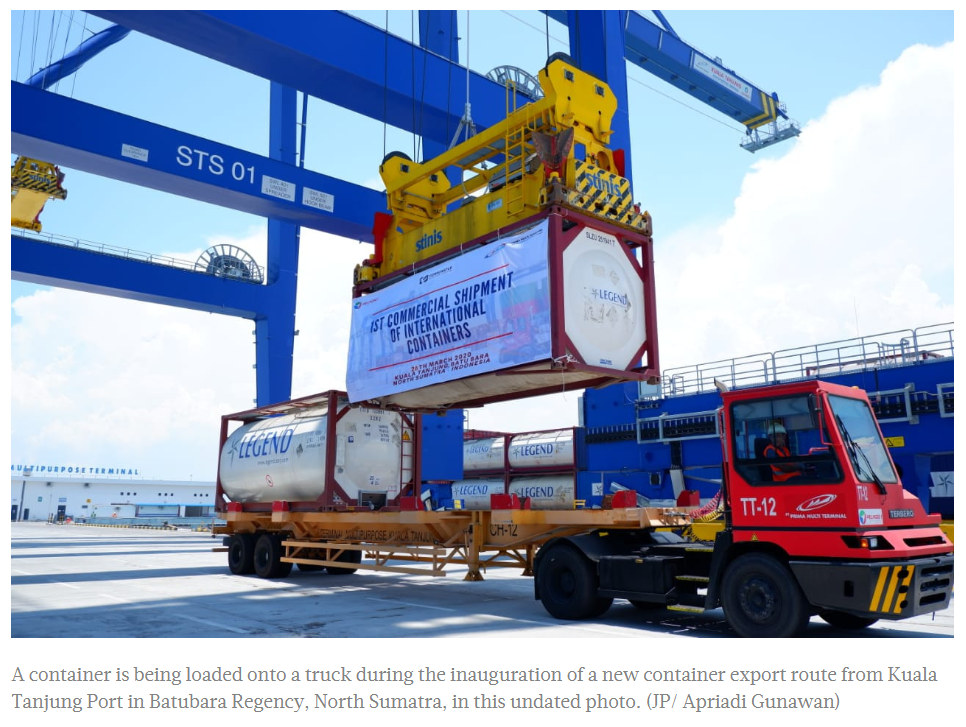Indonesia’s falling imports signals cooling economic activity
Indonesia’s imports have fallen for 10 consecutive months in April as manufacturing companies cut production output while consumer demand continues to shrink amid the COVID-19 pandemic, signaling cooling economic activity going forward.
The country recorded US$12.54 billion in imports in April, an 18.58 percent drop from the same period last year. Imports of consumer goods plunged 16.6 percent, while incoming shipments of raw materials and capital goods dropped 19.1 percent and 17.1 percent, respectively, Statistics Indonesia (BPS) announced on Friday.
“This will be bad for the national economy because this may risk greater deindustrialization as nobody can be sure whether the industry may be able to produce [normally] again,” Indonesian Commerce and Industry (Kadin) deputy chairwoman Shinta Kamdani told The Jakarta Post Friday.
She added that manufacturing companies had cut production as domestic and global demand for non-primary products had fallen significantly.
“There is not much we can do unless we control the outbreak immediately and inject a greater financial stimulus for the economy,” she said.
The manufacturing industry accounted for almost 20 percent of Indonesia’s gross domestic product (GDP), the largest among other business sectors. Meanwhile, household consumption contributed to more than half of the economy.
At least 16,400 people in Indonesia have contracted COVID-19 as of Friday afternoon, with the death toll exceeded 1,000, according to official data. The outbreak has forced shops, factories, offices and schools to shut down as part of the government’s large scale social restriction (PSBB) policy in several regions, including manufacturing centers Jakarta and West Java.
IHS Markit announced recently that Indonesia’s Purchasing Managers Index (PMI), a gauge of the nation’s manufacturing activities, fell to 27.5 from 45.3 recorded in March, the worst decline in the survey’s nine-year history. A number above 50 reflects expansion, while one below 50 indicates contraction.
Indonesia’s trade balance recorded a deficit of US$350 million in April — after booking a surplus a month before — on the back of falling commodity prices and plummeting global demand amid the COVID-19 pandemic, according to BPS data. Exports fell 7.02 percent annually to $12.19 billion.
Mirae Asset Sekuritas Indonesia economist Anthony Kevin said the April trade data painted a reflection of social restrictions implemented by Indonesia and lockdowns in several of its main trading partners.
“Indonesia’s key export markets effectively applied social distancing measures for most of the month, which then led to notable pressures on their manufacturing activities,” Kevin said, adding that at home, Indonesian consumers’ purchasing power also weakened as reflected by the falling imports of consumption goods nearing the Idul Fitri holiday.
“We project that demand for consumption goods for the rest of 2020 will remain weak as there won’t be any momentum left to jack up demand [after Ramadan],” he told the Post over phone interview.
Indonesia’s private consumption usually peaks during Ramadan and Idul Fitri, which falls from April to May this year.
Household spending grew sluggishly by 2.84 percent yoy in the first quarter from 5.02 percent in the corresponding period last year as millions of people lost their jobs because of the pandemic. Indonesia’s economic growth slowed to 2.97 percent from 5.07 percent in the same period in 2019.
Maybank Indonesia chief economist Juniman projected that imports would shrink by up to 19 percent and exports to plummet by 10 percent in the second quarter this year amid large-scale social restrictions implemented across the country.
“With the ongoing social restrictions and plummeting global demand, we expect the domestic economy to contract by 2 percent to 4 percent in the second quarter,” said Juniman, adding that economic recovery and trade activities would depend on the COVID-19 containment progress.
Finance Minister Sri Mulyani Indrawati said in mid-April that the second quarter would be the hardest quarter this year as economic growth could fall to 0.3 percent and even contract by 2.6 percent before slightly recovering to 1.5 percent to 2.8 percent in the third quarter.
“If the difficult situation lasts long enough, there is a possibility of a recession in which Indonesia’s GDP contracts for two consecutive quarters. This is what we’re trying to avoid,” she said.
Source: https://www.thejakartapost.com/news/2020/05/15/indonesias-falling-imports-signals-cooling-economic-activity.html


 Thailand
Thailand




